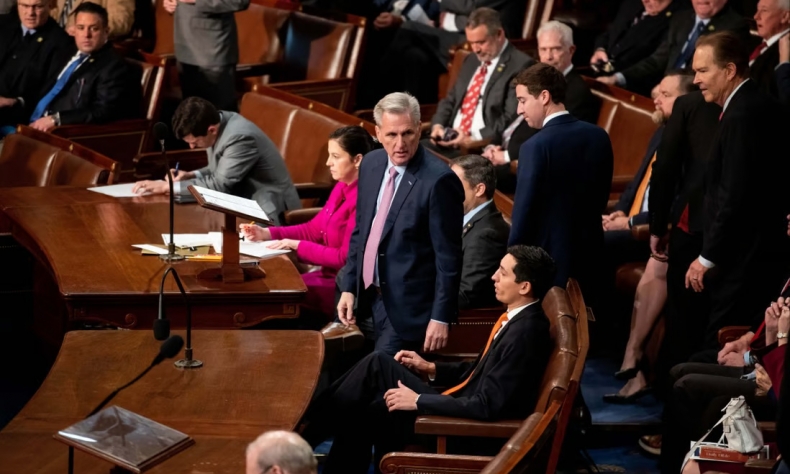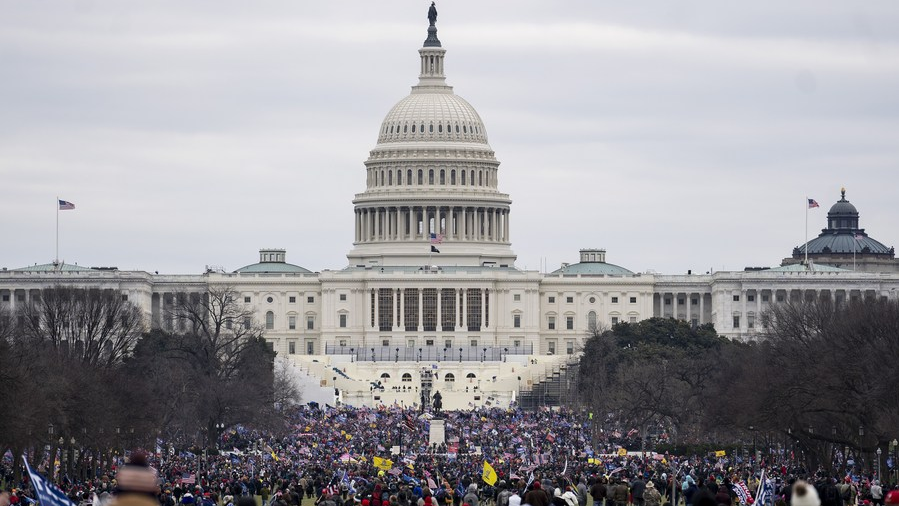The Struggle to Elect a New Speaker Shows the Bitter Divisions in U.S. Politics

The current state of American democracy is increasingly contentious, bitter, and divided.
Kevin McCarthy was recently elected as the new speaker of the United States House of Representatives. The passing of the baton comes with the exit of Nancy Pelosi, who left her position following Republicans taking control of the House in the November 2022 mid-term elections. While one might have assumed the election of McCarthy was a formality, it proved to be anything but. The party’s narrow majority, combined with bitter internal politics, saw McCarthy lose 14 bids to be elected as the speaker due to a cohort of rebel legislators, led by Trump loyalist Matt Gaetz, who sought to impose several political conditionalities for his support, resulting in the group blocking his election again and again. Eventually, on the 15th try, McCarthy was elected to the post.
Never since the American Civil War, in the mid-19th century, had the election of a U.S. House speaker been so contentious. Although he prevailed, as Reuters notes, it comes at a “cost,” one which involved “making extensive concessions to right-wing hardliners that raised questions about the party’s ability to govern.” This speaks volumes about the current polarization of American politics, not least in the Republican Party, wherein the legacy of the former president has caused large-scale division both across the spectrum and within his own party, which has increasingly eroded the political center ground.
The Republican Party has been in a civil war of sorts, wherein moderate or “NeoConservative”-leaning Republicans have found themselves at odds with the “Trump” or “MAGA” faction, which espouses economic protectionism and hard-line nationalism. The former looks at the latter as being morally flawed and repulsive, while the latter sees the former as part of a corrupt establishment who do not vouch for the interests of ordinary people. This has led to a continual battle for influence in internal Republican party elections, such as primaries and nominations for various positions. When the GOP performed less well than expected in the 2022 mid-terms, including having lost the senate to the Democrats, the reaction of many was to blame the Trump faction for its perceived malign influence.
But that hasn’t settled the argument. On at least winning the House of Representatives, the Trumpian loyalists sought to undermine any attempt for a so-called moderate Republican in Kevin McCarthy to become Speaker of the House, taking no hesitation to undermine their own party in the first place. In doing so, this small faction of rebels is utilizing a tactic famously used in legislatures when the leading party only has a small majority, leveraging their numbers to strong-arm the ruling majority into taking on board their own political demands.

This makes the ruling majority “conditional,” a phenomenon that has regularly been seen in the United Kingdom. For example, when the Conservative Party had a small ruling majority in the 1990s and from 2016-2019, pro-Brexit rebels repeatedly undermined the government. This effect is amplified when the political climate of a given country is polarized, and thus the “fringe” rebels have more backing in areas of public opinion to be able to politically gain from undermining the status quo. This reflects the current state of American democracy, which is increasingly contentious, bitter, and divided.
The result is that Kevin McCarthy has been elected as a vastly weakened speaker. The Trumpian rebels will be able to force their demands and agenda onto various bills and items more successfully, which will have a destabilizing effect on American politics. This spells trouble for the Biden administration, who, while having gained the senate, will almost certainly find himself in contention with the House and a speaker who is forced to cater more to the party’s right wing. This will also spell further disruption to U.S.-China relations, as Trump-supporting representatives will be able to push anti-China items and influence the foreign policy of the U.S. in negative ways, irrespective of what the administration wants.
The phenomenon of “congressional gridlock,” whereby the relationship between the executive and the legislature is defined by endless confrontation and frustration, is not a new thing in America, with every preceding president having faced it. However, a key is that in the increasingly divided and polarized environment of U.S. politics, this trend is only going to get worse and have more adverse effects. One simply has to look back at how Nancy Pelosi’s House of Representatives imposed the largest government shutdown ever in a conflict with the Trump administration over funding for his “wall” in 2018-2019. Keeping these previous events in mind, it looks as if American politics will face further bumpy roads ahead.
 Facebook
Facebook
 Twitter
Twitter
 Linkedin
Linkedin
 Google +
Google +







